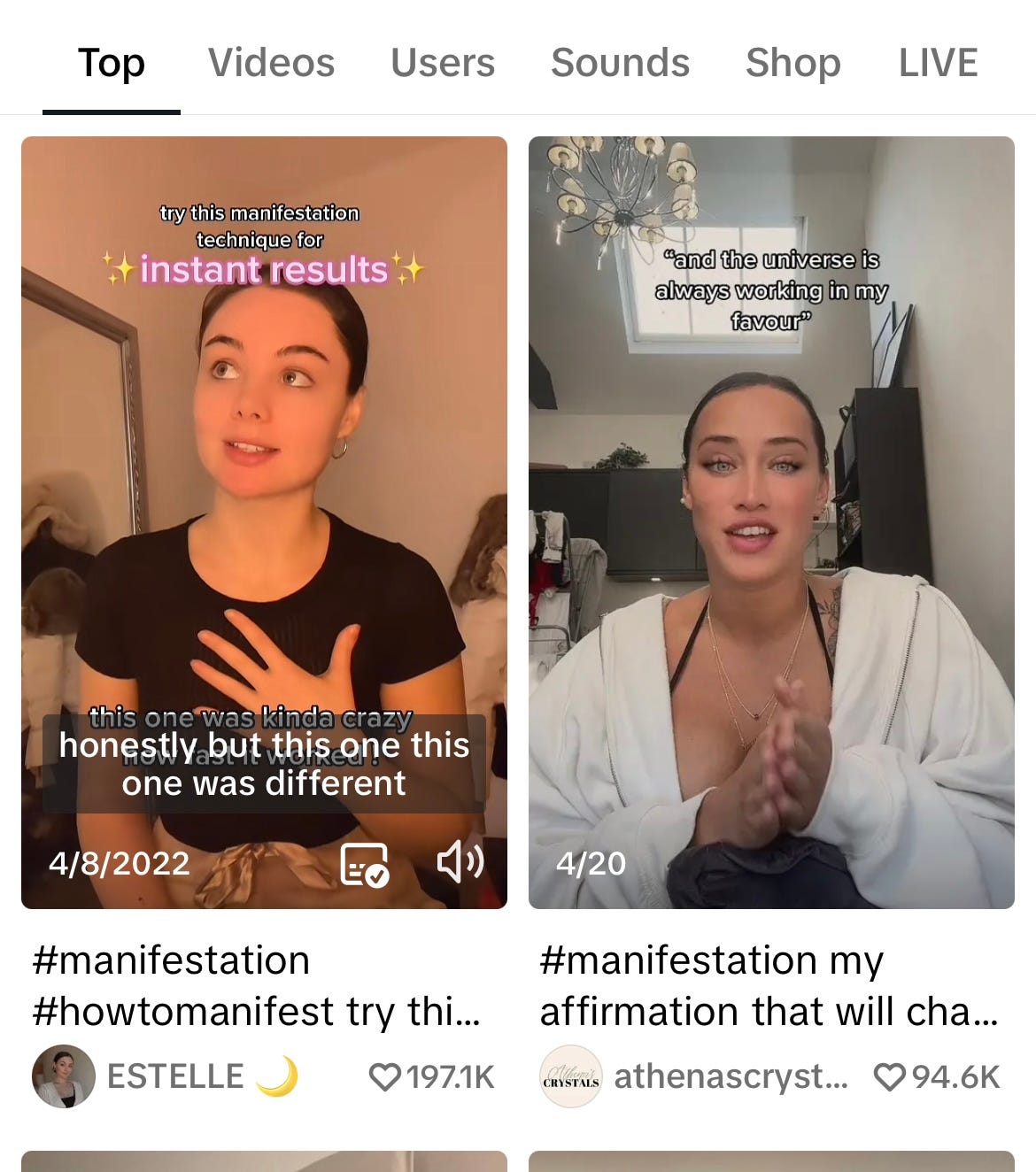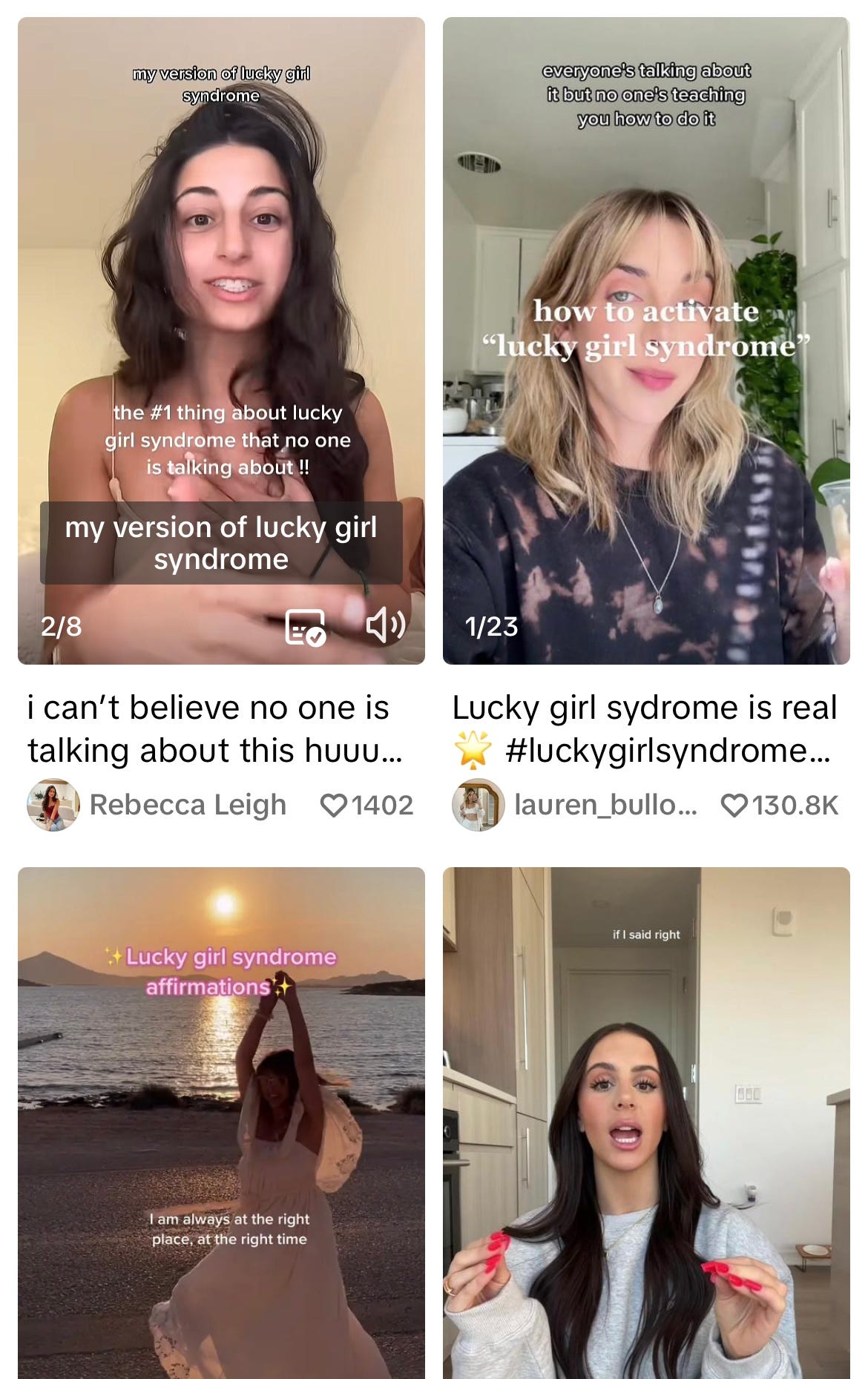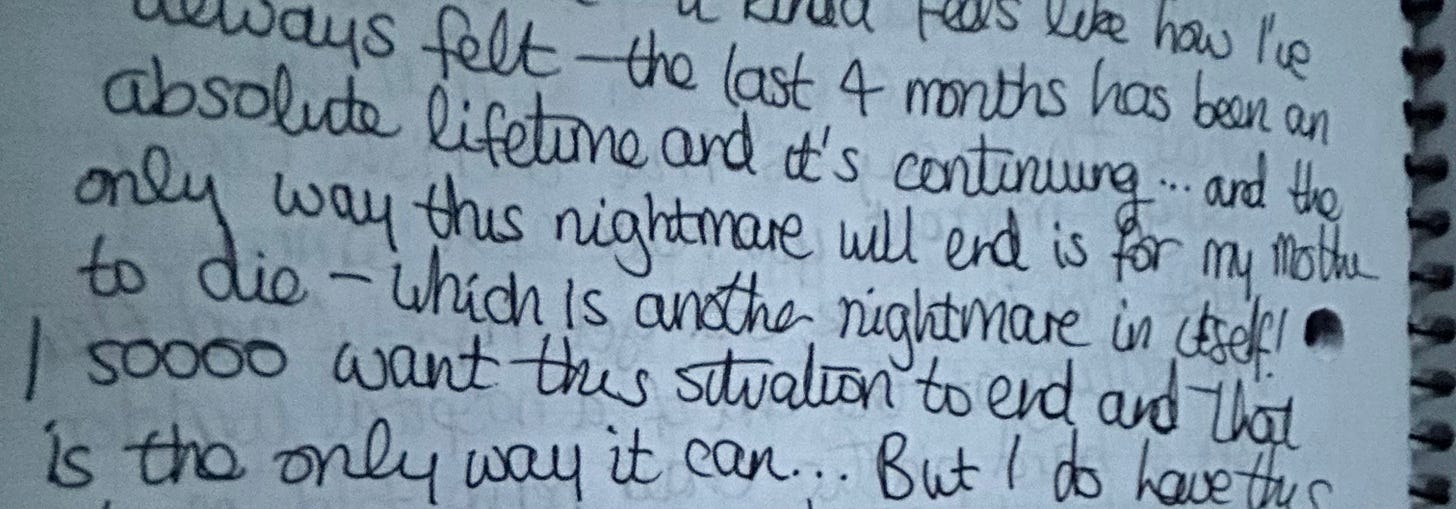Can the law of attraction help those grieving?
Or is it a damaging philosophy that leads to victim-blaming and harm?

Hello! Sorry for the delay, but hopefully this piece, which I’m really proud of, will make up for it! It’s a long, well-researched feature that looks at the issues from both sides and allows you to make up your own mind (something I think is vital and often missing from journalism today, with opinion pieces reigning supreme.) I considered splitting in two but I wanted you to read all sides of the argument, so it has to be in one!
I’d love to do more of this, so if you’d like to support me please consider becoming a paid subscriber. Or if you can’t afford that, another FREE way to support my work is to share it with a friend, either below, or on your social media pages. You can find me here on IG by the way!
“I’m Taylor Swift and if you are hearing this message, you will get Eras tour tickets. You will get those tickets.” I’ve heard this recording, on average, ten to fifteen times per day for the past two weeks. I, like millions across the globe, have to get tickets. I have to be one of the lucky ones.
So, I’m deep in swifttok, which means my algorithm is all friendship bracelets, Speak Now ballgowns and extensive analysis on who certain lyrics are about. A blonde, blue-eyed 23-year-old called Rachel is my new parasocial best friend as she records numerous incredibly helpful videos on how to secure tickets, which I watch and then dutifully forward on to the WhatsApp group I’m in dedicated to our mission. Amongst all of that, I am also receiving videos on how fans ‘manifested’ their tickets and how I should too. The aforementioned sound is played on top of videos that beg me not to scroll past, as if I do I’ll be sending a message to the universe that I don’t want tickets. I don’t want to risk it, so I don’t, hence Taylor’s voice playing on loop in my brain most hours of the day.
As well as NOT SCROLL PAST I am also to write, almost like lines in school, I WILL GET ERAS TOUR TICKETS over and over again until my hand goes sore. I’m to sit with my eyes shut and picture the Ticketmaster page saying ‘congratulations, you’re going to Taylor Swift.’ I should probably just start gluing rhinestones onto a corset top now, pink and purple for Lover, as if I don’t then I definitely won’t get the damn tickets. These are all old manifestation techniques repackaged and Swiftified, and hey, it’s worth a go right?
Manifestation (also known as the law of attraction) has been around since the 19th century, but I guess you could say it truly hit modern consciousness in 2006 with the release of Rhonda Byrne’s The Secret, the self-help manual by Rhonda Byrne that has sold 35 million copies worldwide. Since then it’s been adopted by TikTok and morphed into ‘lucky girl syndrome’ (amongst other iterations) and has been broken down into bitesize videos of women (usually white, blonde, able-bodied and young) enthusing how they manifested their dream life/man/job/career and… yes… Taylor Swift Eras tour tickets.
Now, I don’t have too big a problem with manifestation or the ‘girlies’ that spout it on TikTok. They’re having a nice time and if it makes them feel good about themselves, then, of course, crack on. There are also parts of manifestation theory that I follow myself. I do believe that ‘what’s meant for you won’t pass you by’ and I also write a gratitude journal where my final bullet point each and every time is: I am living a life beyond my wildest dreams. Because I am.
I can look at that list and see everything from a can of Diet Coke, to a roof over my head on there, and see how lucky I am. That, in turn, makes me feel good about myself and feeling good about yourself, and your chances means that you’re more likely to put yourself out there – whether it’s applying for a job, or going on dating apps, or whatever it is you’re looking to manifest.
It’s a self-fulfilling prophecy, with emphasis on the self, as so much of the good things that happen materialise because we work hard and take action. Also, just to add, while some of its practices (mindfulness and gratitude) do have positive scientific backing, the law of attraction (and its various rebrandings) have no scientific proof behind them. Much of its success stories could be, some say, attributed to confirmation bias.
But what about the bad things? As if I don’t get Taylor Swift tickets it won’t be the absolute worst thing to ever happen to me (god, I’ve cursed myself with that, haven’t I?!) but, what if manifestation was around when my mum was dying? Because manifestation tries to tell us that we have a lot more control than we actually do. Bad things happen every single day. If you’re facing illness or infertility could manifestation trick you into believing that you can put a halt to it? Or, that it’s your fault?
I knew that manifesting gurus pay very little to zero attention to social and racial inequality, and the very real barriers that affirmations and visualisations can’t really break down. But, I always thought that their failure to mention these things was born out of naivety. But I was wrong. As, it turns out, particularly in ‘The Secret’ Byrne makes some incredulous victim-blaming statements such as “if people believe they can be in the wrong place at the wrong time, and they have no control over outside circumstances, those thoughts of fear, separation and powerlessness, if persistent, can attract them to being in the wrong place at the wrong time.”
“Cancer victims, sexual-assault victims, holocaust victims – they’re responsible?” says John Norcross, a psychologist and professor, in a LA Times article around the time of release. “The book is riddled with these destructive falsehoods.” It’s also ridiculous considering that inequality is often born into. Are foetuses negatively thinking their way into poverty?!
But none of these concerns slowed down sales. Or stopped the Netflix release of The Secret: Dare To Dream, the book’s film adaptation starring Katie Holmes. It hit our screens in 2020, just as the pandemic took its hold, with COVID eventually killing 7.3 million people worldwide.
The law of attraction seems to really take hold of public consciousness during periods of history where everything is uncontrollable. Another popular title spouting similar theories was Napoleon Hill’s Think and Grow Rich, released in 1936, just after The Great Depression. The law of attraction is, in many ways, spiritual snake oil. Today, the very nature of the ‘don’t scroll past or something bad will happen to you’ TikToks offer that much coveted currency in social media: guaranteed views and engagement.
It's around here that my whole ‘ach, who are these TikTokers harming’ laid-back attitude begins to slip. As the more the watered-down versions of law-of-attraction permeate our culture, so too does the idea that all of society’s ills are (as Rebecca Jennings writes in this brilliant Vox article) “the responsibility of individual people, whose suffering and misfortune is the responsibility of their own failure to think positively enough.”
Thinking of who I was at 19, when my mum was diagnosed, I can see myself tumbling deeper and deeper into the law-of-attraction mindset, until I twisted all of its positives into something darker: that it was my fault her tumour killed her. Not the fact it had attached itself to an inoperable part of her brain. Not the fact that radiotherapy could only slow down its growth, not erase it altogether.
To test this, I Google ‘can I manifest my mum better’ and the second result that comes up is from the popular Reddit forum r/lawofattraction where 260k “believers in The Law of Attraction can get together and discuss their hopes, beliefs, fears, triumphs, and anything in between.”
“I’ve read about LOA (law of attraction) for years, one person writes. “But, I don’t have much success with it. I feel inspired and happy when I read success stories, but… when I visualise I didn’t have much success… Now I really want to make LOA work. I want my mom to get better. I want her to be healthy, to not be in pain and to not be hospitalised. I only have her. I would do anything for her.”
The advice this poster is given is predictable. They’re told that by saying ‘it doesn’t work for me’ they’re already setting themselves up to fail. That they have to go to sleep at night and imagine their mum being better ‘over and over again a thousand times’ until they fall asleep. Another says “miracles happen everyday for many people, why not you?! It’s in YOU!”
As I began to read the advice given, a sense of unease fluttered through my stomach. This niggling, uncomfortable feeling that arose took on a stabbing form of self-blame. What if I’d done these things? Filled my brain up as much as possible with thoughts of healing? Would she be here today? I thought that you could cherry-pick what you believed the law of attraction could magic into your life, stick to the light stuff, the Taylor Swift tickets and be realistic about the dark. But, I don’t think that’s possible. As these thoughts plagued me today, as a rational 38-year-old journalist who fact-checks thoughts and theories with science-backed studies and comments from experts, and I’m still struggling to shake them.
(me at 19, just before my mum’s diagnosis)
I clicked through to the profile of the poster, hoping for some sort of update. There was none. They had only replied to one comment saying “I try really hard to get rid of negative thoughts, but I have anxiety and [these] thoughts keep coming.”
Because the other thing the law-of-attraction glosses over is how hard it is to “just think positively” Particularly when facing something really, really rough or you have a mental health condition that makes “thinking shiny, happy thoughts” near impossible.
As, it’s been found that, while the majority of people have what’s called an optimism bias (with studies finding that people with it expect to live longer, and be healthier than average amongst other things) it’s not present in everyone. Some people have a pessimism bias, and this bias is associated with depression symptoms. Depressed people also show differences in certain brain regions when imagining (or ‘visualising’) future events.
What’s more, the law of attraction could actually be tied to OCD, depression, eating disorders, psychotic disorders and generalised anxiety. It’s all down to something known as thought action fusion, a psychological term for the belief that thoughts and actions are somehow linked together’ and that thinking something is the same as doing it, or that thoughts alone can cause things to happen (sound familiar?!)
As Javier Pardina writes in this Vice article exploring the link between mental health “a person with social anxiety might believe that because they think others are judging them, that makes it true. A person with depression might believe that because they think life isn’t worth living, that extends to reality,” they write. “In the therapy sessions that I attend each week for anxiety and OCD I spend a lot of time learning the opposite lesson, that thoughts do not equal reality. Just because I think that a surface is covered in germs… or think something bad will happen – those thoughts do not translate to real life.” Something that the law of attraction directly contradicts.
An extract from my diary when mum was ill
It's all so easy to get trapped in: this idea that our negative thoughts are influencing our reality. That it’s all our fault. I was a big believer in optimism when my mum was ill – I still am – but, of course, I had negative thoughts. I even, at times, wished that she would die: the suffering of watching her deteriorate became too much to bear. So, did my very natural thoughts lead her to die?
The answer is no. Rationally, I know this, but it doesn’t stop me from searching for the ‘miracle’ I could have missed out on. From reading (and feeling that niggling self-blame with) each and every success story on The Secret website of people who used the method to ‘cure’ cancer. (most of which also come with stories of people also seeking out new doctors and new medicines… but it’s no surprise that another criticism of the book is that it could lead to people to stop taking the drugs they need replacing them with visualisations of a miracle.)
I also continue to put myself back in my 19-year-old brain and Google ‘can I manifest cancer away.’ The top two results are that Reddit forum again (proclaiming ‘yes you can manifest cancer but you can also manifest the cure for it’ – A CLAIM WHICH THERE IS ABSOLUTELY NO SCIENCE OR MEDICAL PROOF BEHIND) and an article from a writer in early 2016, on how much The Secret has been helping her since her cancer diagnosis. It’s a nice read, she’s so positive and takes Tipp-Ex to travel documents changing “due to chemotherapy it is not advisable for her to travel” to “due to her perfect health, it is recommended that she travels.” She surrounds herself with ‘Tiggers’ saying that ‘we all have Eeyores in our life and I’ve stopped spending time with them.’ She sounds – despite everything – happy.
After reading, I then search her name.* She died in 2020, six-years after her diagnoses. The piece honouring her mentions all of the incredible things she did with her life, things I am sure her optimism and law of attraction will have led her to.
At the end of the piece about her cancer she had written, “ultimately I may not have control over the final outcome of my physical body, however doing these activities gives me control over disease mentally, emotionally and spiritually. And, most importantly, I’d prefer to leave this Earth knowing I exuded love, positivity and possibility – all of which are things needed in today’s world more than ever.”
It left me in tears. I sat at my window seat, computer on my lap, and thought of how she had managed that. How wonderful she sounded, when her family wrote tributes to her.
How unfair it all was, is, that the brutality of cancer will extinguish whole lives no matter what we do. How, at times when everything is uncontrollable, the idea of rewriting your story, is deeply appealing. How it could have made life that little bit easier, had I gone to sleep imagining mum back at her healthiest, singing to me in the kitchen. But it also could have lured me into thinking, with every hospital admission, with each coma she slipped into, that I had somehow caused it, by the angry and terrified writings in my diary.
Ultimately, the question is - even knowing all of that and seeing how both harmful and helpful law of attraction thinking can be - how much should we believe? And how possible even is it to still trust in a happy ending?
Thank you so much for reading. Please let me know what you think in the comments below. And just a note* on the writer, I deliberated including her name in the piece but as the piece begins with some (fair) criticism on the law of attraction I hated the idea of her family coming across this, reading and thinking it was directed at her. It’s not. She sounded incredible, and if you do want to read more about her life you can do so here.







Love this Katie, and beautifully written as ever. I’ve long had an issue with the idea of manifesting - largely because of the lack of recognition of privilege and victim blaming flip side you mention - but I also generally believe that’s “what’s for you won’t go by you” which I guess is it’s own form of magical thinking. So thank you for verbalising that dichotomy in such a thoughtful and nuanced way xx
i loved this piece. the whole ‘manifesting’ movement is so fascinating, but this made me feel so sad for alternative universe katie who might’ve blamed herself. i hope it encourages people to be careful with how much they rely on this to ‘help’ themselves, or it could just lead to so much more helplessness.